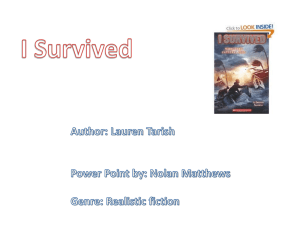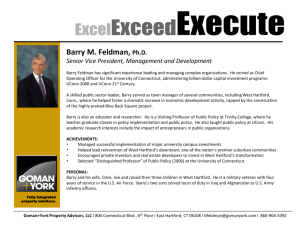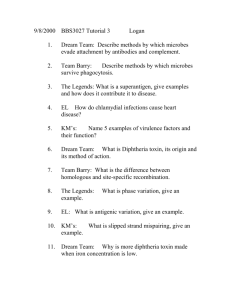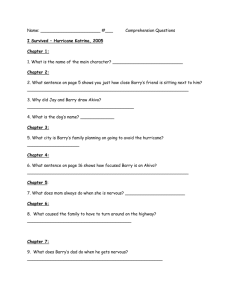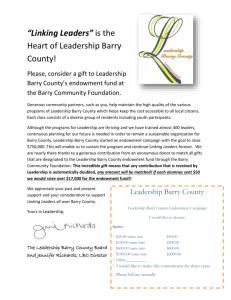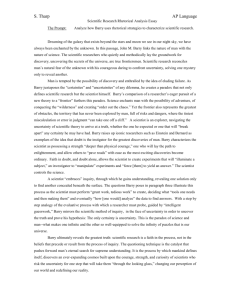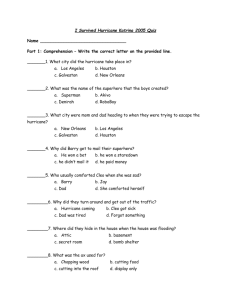Faculty Incentive Grant Program
advertisement
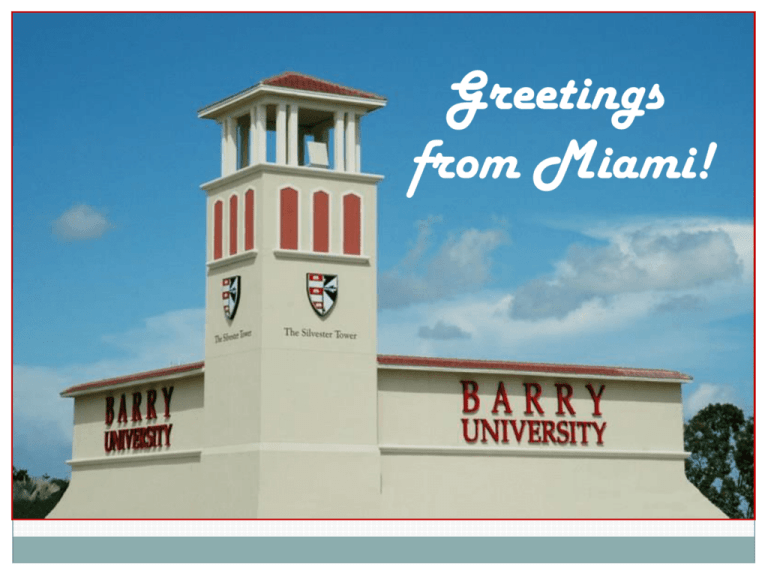
Greetings from Miami! Creating, Implementing and Evaluating an Internal Grant Competition on a PUI Campus Patrick W. Lynch Director, Office of Grants and Sponsored Programs plynch@mail.barry.edu Overview of Today’s Presentation Brief introduction to Barry University The structure of research administration at Barry Challenges promoting research on our campus Faculty Incentive Grant Program (FIGP) Securing university support for the program Creating the eligibility criteria and application guidelines Developing a web-based application system Conducting a peer review process Advertising and launching the FIGP Lessons learned during the past two years About Barry University Founded in 1940 as Barry College for Women by the Adrian Dominican sisters A Catholic, private, liberal arts university About Barry University Predominantly undergraduate, teaching institution (17:1 student-teacher ratio) Approximately 5,000 undergraduate students; 3,700 graduate students; seven schools and two colleges 53 undergraduate programs; 65 graduate programs (including 10 doctoral degrees) 350 FT faculty and 400 PT faculty About Barry University Approximately 39% of the fall 2009 class self- reported as “first-generation” students Fall 2011 Undergraduate Enrollment: 26% Hispanic According to the 2009 U.S. News and World Report Best Colleges Edition, Barry University tied for 10th place among more than 250 American colleges and universities for most racially diverse student body Research & Sponsored Projects Board of Trustees President Division of Academic Affairs Provost Division of Student Affairs Division of Business Development Division of Institutional Advancement Division of Business & Finance Preaward Postaward Challenges Barry does not offer tenure to faculty Full-time faculty can only work on grants while under contract if released from a % of their duties; release time rarely exceeds 20% There is no incentive pay for faculty to work on grants Barry has limited research facilities Few faculty members have experience writing grant proposals The culture is clearly one focused on teaching in the classroom, not research in the laboratory Our mission and identity sometime influence our ability to pursue certain initiatives Why an Internal Grant Program? To promote research on campus and to financially support faculty projects To convey university support for research endeavors To introduce faculty members to the grant proposal process To fund small projects not suitable for most external funders To increase grant submissions to external funders Securing University Support Conducted a preliminary analysis of faculty members’ frustrations/concerns Conversations with the VP for Institutional Advancement, the Provost, the President Presentation to the Board of Trustees Defining the Eligibility Criteria Any full-time Barry faculty member can apply. “Full- time” is defined as having at least a 9-month contract; A maximum of $5,000 may be requested; All applications must be submitted using the web- based application system; Applicants must have the approval of their Dean prior to submitting an application; Defining the Eligibility Criteria Applicants may not request any funds to support their salary; Applicants may submit only one proposal during a single grant cycle; If an applicant is chosen for funding during one grant cycle, s/he cannot compete in the next, consecutive grant cycle; Defining the Eligibility Criteria Faculty members must be returning to Barry on a full- time contract for at least one-year after receiving an award; Grant recipients must have Institutional Review Board approval if the research project involves human subjects or Institutional Animal Care and Use Committee approval if the project involves animal subjects prior to project implementation; Defining the Eligibility Criteria Grant recipients will be required to provide a six- month update on the progress of their funded projects to the Review Committee and any additional updates as requested by the Committee; Grant recipients will be required to do a public report of activities/findings to the Barry community upon completion of the grant cycle; Defining the Eligibility Criteria Grant recipients will be expected to submit an application for external funding within six months of the completion of their Faculty Incentive Grant. Funds do not need to be requested for the same project funded under their Incentive Grant. Recipients that do not follow these guidelines will be prohibited from applying for an Incentive Grant for three years; All projects must be completed within the two-year award period. Any funds not expended during the 24-month period will be forfeited; Defining the Eligibility Criteria The Provost and/or the Review Committee may decide to award all or only part of your funding request; Your project must be new or enhance an existing project or program. Funds cannot be used to support current projects that are already budgeted for within your area or funded from an external source. New projects will take precedence over enhancements to existing projects. Application Guidelines: Narrative 1. Abstract (200 words or less) 2. How will your project promote Barry’s mission? (100 words or less) 3. Problem Statement: (350 words or less) 4. Research Strategy: (750 words or less) Application Guidelines: Narrative 5. Evaluation Methods: (350 words or less) 6. Benefit to Students: (300 words or less) 7. Timeline: (100 words or less) 8. Attachment (optional- up to three pages) Application Guidelines: Budget Student wages Supplies (under $2,500) Equipment ($2,500 and over) Travel expenses Consultant and/or contractual fees Printing and/or marketing Participant-related costs Other direct expenses that can be justified for the project News Bulletin Dear members of the faculty, I am pleased to announce the availability of internal grant funding under Barry’s 2012 Faculty Incentive Grant Program. This second year of the program is again being made possible through generous support from the Board of Trustees. If you are a full-time faculty member on a 9, 10 or 12-month contract and would like to apply for a grant award of up to $5,000 to support a research (or creative activity) project, you are eligible to apply. Anyone interested must attend a mandatory workshop being conducted by the Office of Grant Programs on either Monday, February 6th from 3 - 4:00 p.m. or Tuesday, February 7 th from 10 - 11:00 a.m. Both workshops will be held in LaVoie 113. I will provide an introduction to the program and Patrick Lynch, Director of Grants and Sponsored Programs, will explain the processes and procedures for preparing and submitting a grant application. You must register for one of the workshops posted under the Training section on BUCWIS if you wish to submit a grant application during this grant cycle. The application period will open on Wednesday, February 8th and will close at 5 p.m. on Wednesday, March 14th. I hope that many of you will take advantage of this new opportunity as a means to conduct innovative and exciting research projects at Barry. If you have any questions prior to the workshops, please contact Patrick at extension 3072 or via e-mail at plynch@mail.barry.edu. Best regards, Linda M. Peterson, PhD Provost, Barry University Web-based Application System Web-based Application System Web-based Application System Web-based Application System The Peer Review Process Review Committee members appointed by the Provost All members score all applications on their own using a Score Sheet Scores and comments are entered into the online application system Peer Review Process: Score Sheet Scoring Criteria Abstract Point Value Score 0 NA This section is intended only to provide the reviewer with a concise overview of the project and is unscored. 1. Promotes the Barry Mission 10 How well does the applicant connect his or her project concept to the Barry mission? 2. Problem Statement 15 How well does the applicant clearly state the problem or issue to be addressed? Is the issue well supported with information (e.g. statistics) that justifies the problem? 3. Research Strategy 25 How well does the applicant describe his or her project? Are action steps concrete and specific and do they appear realistic and appropriate? Does the proposed project adequately address the issue or problem identified? Is there an innovative approach explained? Are research methods appropriate and clearly outlined? 5. Evaluation Methods 20 How well does the applicant describe his or her evaluation strategies? Is it clear how the applicant will measure his or her progress and results? 6. Benefit to Students 10 How much impact will the project have on our students? Consider whether students will directly or indirectly benefit from the project. 7. Timeline 5 Can the project be reasonably accomplished during the proposed timeline? 8. Budget 15 Is the budget complete and accurate? Are the proposed costs reasonable and appropriate for the proposed project? Are expenses clearly and thoroughly justified? Total 100 0 The Peer Review Process Preliminary scores are aggregated and averaged One committee meeting is held Each member presents on assigned applications Each application is discussed for a designated period of time Following the meeting, scores/comments can be revised Summary of results provided to the Provost Final decisions made and announced Scores/comments sent to all applicants News Bulletin Faculty Incentive Grant Program Winners Announced! The Office of the Provost and the Office of Grants and Sponsored Programs are pleased to announce the following winners of the FY 2011 Faculty Incentive Grant Program: (in alphabetical order) • Stephanie Bingham (Arts & Sciences): “The Effect of Embryonic Ethanol on Zebrafish Cranial Motor Neuron Development” • Paula Delpech (Health Sciences): “Developing Community-Based Participatory Research Project to Address Early Childbearing Among African American Adolescents” • Bretton Engle (SSW): “Training Social Workers in Motivational Interviewing: On-going Individualized Feedback Versus a Workshop Only” • Constance Mier (HPLS): “Energy Expenditure During Long Distance Kayaking” • Mitchell Rosenwald (SSW): “Perspectives on Success by Youth Transitioning to Adulthood Who Use Independent Living Services in Broward County” • Ye Sheng (Business): “A Study of Chinese Consumers’ Animosity Towards Foreign Products” During this first year of the program, a total of 21 applications were received totaling $92,514 in requested funding. All $20,000 approved by the Board of Trustees was awarded. This was an excellent start to an exciting new program- thank you to everyone who participated! The Board of Trustees has allocated another $20,000 for the FY 2012 Faculty Incentive Grant Program. Details of the program will be announced in January. Linda M. Peterson, PhD Provost, Barry University Post-Award Processes Funds deposited in College/School account Faculty member and his/her Budget Manager will be responsible for monitoring project expenditures 6-month Progress Report includes update on expenditures Unspent funds revert back to the University Faculty Incentive Grant Program: Timeline Tasks/Deliverables Sept. BOT approves $20,000 allocation for FIGP Grants Office develops draft eligibility criteria and application guidelines (including narrative and budget requirements) Various meetings with the Provost and Vice Provost to obtain feedback and revise guidelines Various meetings with the Budget Office and Grants Finance (post-award) FIGP Criteria/guidelines finalized Development of web-based application system with DoIT Mandatory training workshops held for all potential applicants Review process developed Application Period open from March 25, 2011-April 22, 2011 Final Review Committee Members appointed First meeting of Review Committee Initial reviewer scores due in web-based system Final meeting of Review Committee Final scores/recommendations provided to the Provost Funding decisions announced Mandatory grant management workshop for all awardees Project period begins for all awardees 2010 Oct. Nov. Dec. Jan. Feb. Mar. 2011 Apr. May June July Lessons Learned Need to consider applications for “creative activities” Must stress to applicants that narratives should be written in plain language and as free of disciplinespecific technical language as possible If collaborators involved, a letter of support/commitment should be mandatory Make it clear to Review Committee that their comments will be shared with applicants ` Questions?
